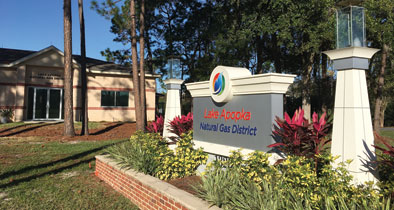

To say 2020 will go down in history as an unprecedented year would be an understatement. We’re only at the midway point but there’s no time for intermission or a halftime show. Since late winter, our country has been embattled with a global pandemic that swept the nation, straining essential resources while millions of Americans were ordered to shelter in place for months on end. Now, in the midst of this recovery, we’re facing what the National Oceanic and Atmospheric Administration (NOAA) predicts to be an “above-normal season” for hurricanes in the Atlantic that will once again strain communities and resources throughout the country.
Preparing for a pandemic and hurricane require varying essential items, but a critical commonality is access to resilient, reliable resources. The choice for consumers to access natural gas directly in their homes is crucial now, more than ever, and should not be put at risk. With businesses shifting to work from home models and children embracing, or rather accepting, distance learning, the direct use of natural gas with its triple benefit of providing efficient, reliable and resilient energy is a key part of our country’s energy infrastructure.
Reliable, resilient energy is not something we should take for granted. Disruptions in electricity have significant cost, health and safety implications that cannot be ignored. Our most vulnerable populations are particularly at risk in the midst of power outages and natural disasters. This is why our first responders, hospitals and senior living facilities rely on the support and security of natural gas generators to keep the lights on and operational services functioning. What’s more, disruptions in electricity supply cost American consumers an estimated $150 billion a year.
Strains to the U.S. electric grid will continue to increase as Americans across the country brace for another hot summer and as peak hours for powering homes expand to accommodate the hottest part of the day. Experts warn this change “will push the system to its limits,” leaving families, forced to spend an unprecedented amount of time inside, without power. The grid has limited capacity and when that capacity is met, consumers without access to direct use of natural gas will be left without the ability to cook meals and take warm showers.
Americans in every part of the country are vulnerable to blackouts. Reliance on intermittent power sources and the electric grid leave us all at risk in the midst of hurricanes, wildfires, snowstorms, flooding and tornadoes. In 2018, six U.S. states broke wildfire records and the U.S. Forest Service warns 2020 will be “higher than average for wildland fire” activity. Just last year, there were 14 billion weather and climate-related disasters, including an Atlantic hurricane season with 18 named storms and flooding across the nation that impacted 14 million individuals.
In preparation and in the wake of an emergency, access to direct use of natural gas is one of the most valuable resources in any home. It’s imperative that consumers maintain the choice of using natural gas directly in their home, ensuring they have reliable and efficient resources available year-round to be prepared for whatever comes their way.
As we look to the remaining months of this year, into 2021 and beyond, it’s critical that we protect first responders, hospitals and senior living facilities’ access to reliable natural gas and ensure they have the tools they need to help our communities thrive in the wake of any unforeseen events. That’s why a comprehensive approach to our country’s energy future is vital. Relying on a sole energy source, particularly one produced with intermittent resources, limits the ability for consumers to have the security of energy reliability that natural gas provides.
With its abundant domestic supply and safe, reliable and efficient underground delivery system that provides three times the efficiency of electricity at one third of the cost, natural gas has a valuable and essential role to play in national, state and community emergency responses. While we can’t predict what the rest of 2020 will bring, we can help consumers weather the storms by protecting access to reliable and resilient energy in their homes.
Submitted by: Lake Apopka Natural Gas District
Written by: Dave Schryver June 29, 2020
Dave Schryver serves as President and CEO of the American Public Gas Association, a trade association representing more than 730 local, municipally owned natural gas systems in 38 states.
Advertisement
